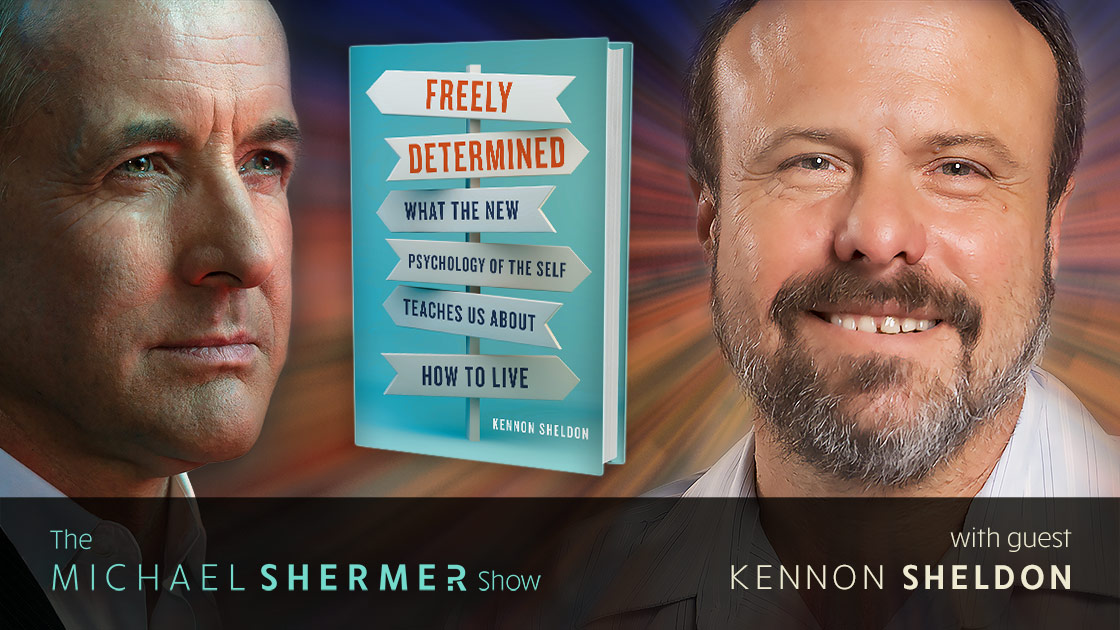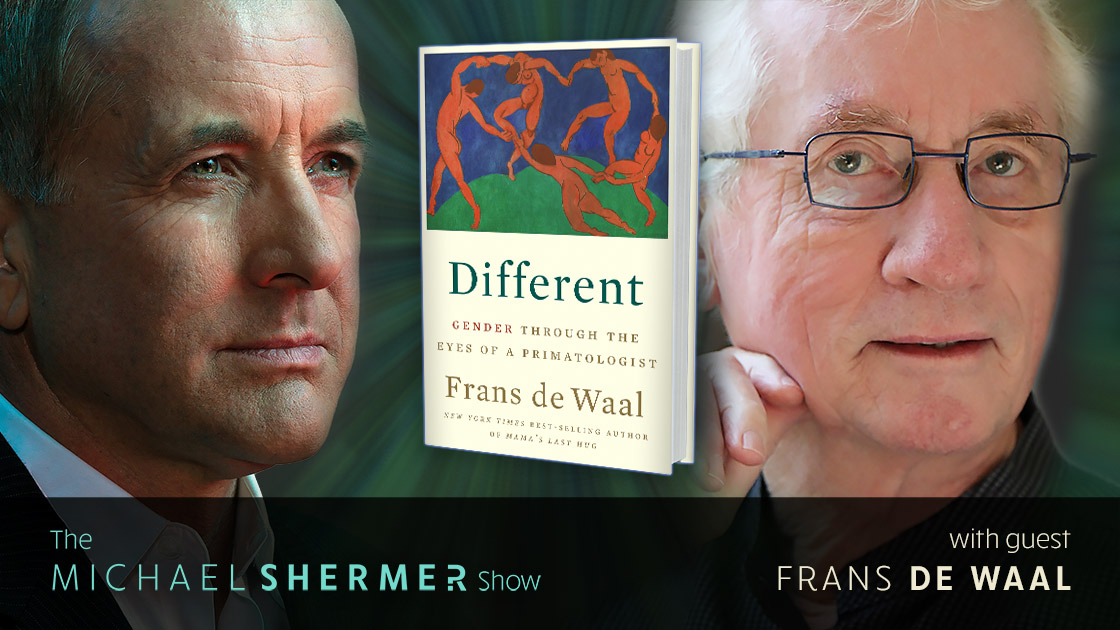behavior

What happens when sex is more about identity than pleasure, intimacy, or interaction? And what happens when culture warriors gang up on sexuality—and from several directions? And has this affected our mental health? After over 40 years and 40,000 sessions with individuals and couples as a Licensed Marriage and Family Therapist and Certified Sex Therapist, […]

Shermer and Sheldon discuss: definitions of free will, determinism, compatibilism, libertarian free will • dualism • reductionism, materialism, predetermination, and epiphenomenalism • Christian List’s three capacities for free will • AI, Star Trek’s Data, sentience and consciousness, ChatGPT, GPT-4 • how what people believe about free will and determinism influences their behaviors • the case for hard determinism • brain injuries, tumors, addictions, and other “determiners” of behavior • emergence • symbolic self • System 1 vs. System 2 thinking • Experiencing Self vs.…

What is gender? How different are men and women? Are differences due to biological sex or to culture? How do they compare with what is known about our fellow primates? Do apes also culturally learn their sex roles or is “gender” uniquely human? Michael Shermer and Frans de Waal discuss sexual orientation, gender identity, and the limitations of the gender binary, exceptions to which are also found in other primates.
Mark W. Moffett remind us that breakthroughs in science often come about by exploring points of similarity between things that are normally seen as very different. PLUS: Michael Shermer speaks with quantum physicist, Jim Al-Khalili, who reveals how 8 lessons from the heart of science can help us all get the most out of our lives. PLUS: In SRC Report PCIS-005, we take a look at Conspiracy Theory Endorsement by Generation.

Mark W. Moffett describes how comparing identical things is extremely boring; breakthroughs in science often come about by exploring points of similarity between things that are normally seen as very different—in his own research, and that of his mentor, Edward O. Wilson, ants and humans.
In Science Salon # 60 — exceptionally important conversation — Dr. Shermer discusses at length the background to and research of Dr. Nicholas Christakis, a physician and evolutionary sociologist famous for his study of social networks in humans and other animals. PLUS: The breadth of what can be meant by the word “hoax” makes the concept — and consequences — worthy of renewed study. Michelle E. Ainsworth reviews Bunk: The Rise of Hoaxes, Humbug, Plagiarists, Phonies, Post-Facts, and Fake News…

In Science Salon # 60 — an exceptionally important conversation — Dr. Shermer discusses at length the background to and research of Dr. Nicholas Christakis, a physician and evolutionary sociologist famous for his study of social networks in humans and other animals.
IN THIS RIVETING STORY about his remarkable discoveries from the Gogo fossil site in the Kimberly district of Western Australia, the Australian paleontologist John Long, now Vice President of Research and Collections at the Natural History Museum of L.A. County, takes us beyond just reconstructing animal morphology and into the realm of restoring ancient behavior…
INTREPID INTERNATIONAL EXPLORER, biologist, and National Geographic photographer Mark W. Moffett, “the Indiana Jones of entomology,” takes us around the globe on a strange and colorful journey in search of the hidden world of ants. In tales from Nigeria, Indonesia, the Amazon, Australia, California, and elsewhere, Moffett recounts his entomological exploits and provides fascinating details on how ants live and how they dominate their ecosystems through strikingly human behaviors, yet at a different scale and a faster tempo…
In this week’s eSkeptic, Dr Harriet Hall, MD, (aka the Skepdoc) reviews 50 Great Myths of Popular Psychology: Shattering Widespread Misconceptions about Human Behavior by Scott O. Lilienfeld, Steven Jay Lynn, John Ruscio, and Barry L. Beyerstein.
One of the most difficult problems in the social sciences is understanding why some people intentionally inflict emotional and physical pain on others. Such intentional pain occurs not only on a local level — within families, with “friends,” or in work situations, but also on a national and international scale — Hitler’s Holocaust, Stalin’s purges, and Chairman Mao’s slaughter of millions. Neuroscience is providing the potential for a revolution in our understanding of why “bad” people do what they do…
Why do people dodge responsibility when things fall apart? Why the parade of public figures unable to own up when they screw up? Why the endless marital quarrels over who is right? Why can we see hypocrisy in others but not in ourselves? Are we all liars? Or do we really believe the stories we tell? Renowned social psychologist Dr. Carol Tavris takes a compelling look into how the brain is wired for self-justification…
In this week’s eSkeptic, Jennifer McKevitt reviews by Philip Zimbardo’s book entitled The Lucifer Effect: Understanding How Good People Turn Evil.
In this week’s eSkeptic, Michael Shermer tries out some new ideas at a free lecture on evolutionary economics; and Dr. Philip Zimbardo lectures at Caltech on the topic of The Lucifer Effect: Understanding How Good People Turn Evil.
In this week’s eSkeptic, we announce: Julia Sweeney’s new CD Letting Go of God, now available at shop skeptic; James Randi compiles a remarkable line-up of speakers for The Amazing Meeting 5; and Michael Shermer sheds some light on Kramer’s Conundrum, in an LA Times op-ed on racism.
In this week’s eSkeptic, Kenneth W. Krause reviews Laurence R. Tancredi’s book, Hardwired Behavior: What Neuroscience Reveals About Morality.
In this week’s eSkeptic, Michael Shermer reviews Blink: The Power of Thinking Without Thinking by Malcolm Gladwell.
In this week’s eSkeptic, Susan Carol Losh, Ph.D. responds to an earlier eSkeptic (“Sex, Brains & Hands — Gender Differences in Cognitive Abilities” by Diane Halpern, Tuesday, March 15th, 2005) with a letter titled “Mr. Summers’ Hidden Agenda: Women, Men & the 80-Hour Work Week.”
In this week’s eSkeptic, Paul R. Gross and Alondra Oubré tackle Vincent Sarich and Frank Miele’s book Race: The Reality of Human Differences.
Philosopher and evolutionary psychologist David Livingstone Smith elucidates the essential role that deception and self-deception have played in human — and animal — evolution and shows that the very structure of our minds has been shaped from our earliest beginnings by the need to deceive…













